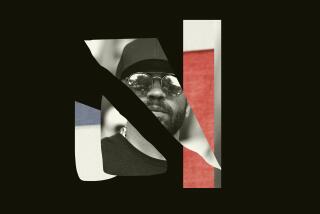Cuba Rallies for Boy at Tributes to National Hero
- Share via
HAVANA — By the hundreds of thousands, schoolchildren took to the streets of this Communist nation Friday to honor legendary poet Jose Marti, a national hero shared by Cubans on both sides of the Florida Straits. But pinned to their shirts was the image of a 6-year-old boy who has come to symbolize all that divides them.
A mournful photo depicts shipwreck survivor Elian Gonzalez behind a chain-link fence at the house of distant relatives in Miami. Below, a message reads: “Who has said a songbird needs a golden cage?”
The rallies came on the 147th anniversary of the birth of a literary figure who has defined Cubans’ identity for more than a century--and whose name is emblazoned on the school Elian now attends in Miami. Friday’s imagery provided stark evidence of how effectively President Fidel Castro has harnessed the international custody battle over the boy to rekindle support here for his regime, his ideology and his home-grown morality--and demonstrate their advantages over those in the exile community in Miami.
“Elian is the greatest gift the Cuban revolution could have asked for,” said Oreste Lamar, 45, a primary school teacher at a Marti Elian rally in the city of Matanzas, about 50 miles east of Havana, the capital.
“As a living symbol for us to use to explain our ideology, our identity, our values and our moral advantages over those people in Miami, Elian is like Marti himself--a miracle.”
For Castro, the bearded revolutionary who has survived a 40-year U.S. embargo and nearly a decade of economic crisis since the collapse of his Soviet benefactor, the Elian dispute could not have come at a better time.
“For Fidel, it’s a win-win situation,” said one Cuban intellectual who asked not to be named. “If the boy comes home, he wins. If he doesn’t, it proves Fidel was right all along: Neither America nor this so-called Miami mafia respects the basic rights of a father.”
Some of Cuba’s political dissidents have publicly called for Elian’s return. And even Cubans who privately say they hope someday to leave a nation where the state controls almost everything in life for America’s “land of the free” asserted that Miami’s Cuban American leaders are undermining their own political cause by fighting something so personal and universal as a father’s love for his son.
Since the boy’s Thanksgiving Day rescue from an inner tube off Florida, Cuban television, radio and newspapers have been filled with the Elian saga. He has provided the country with a powerful symbol for the vast cultural rift between the hundreds of thousands of Cubans who have fled to capitalist Florida and the millions who have stayed behind since Castro’s revolution on New Year’s Day 1959.
Elian’s father has personally furthered that view, asserting to CNN here Thursday in the first of several officially arranged interviews this week that he will not go to Miami to reclaim his son and become “a second kidnap victim.” The Cuban American lobby is rumored to have offered the father up to $4 million to come to the United States to pick up Elian.
Now, from the street corners to the halls of power, Elian--whose mother died along with 10 others on a voyage born of temptation--is seen as a prisoner of both a corrupt consumer society and a U.S. immigration policy that is luring Cubans to despair or death.
The boy’s continued presence in Miami--where “Little Elian” always is pictured inside his great-uncle’s fenced-in, postage-stamp-size yard--amounts to nothing less than kidnapping, the government charges. The culprits, the official line continues, are distant relatives who have been bought off by a “Cuban American mafia” that is shattering all moral barriers by blocking the legitimate custody claim of the boy’s father here in Cuba.
And at a time when thousands of Cubans--driven by the lure of riches that the country’s emerging dollar economy only hints at--are leaving each year from a land where education, health care and basic necessities are free, the subtext is clear: You’re better off here.
“It’s true. Elian has come to symbolize a great many things for us,” Cuban Culture Minister Abel Prieto Jimenez said in an interview as he helped preside over Friday’s Marti anniversary celebration in Havana.
“Everything in Cuba today leads back to this kidnapped boy,” he said. “There’s tremendous popular sentiment.”
Interviews with ordinary Cubans on the street and in their homes this week, from Havana to Elian’s hometown of Cardenas about 80 miles to the east, supported Prieto’s contention.
Beatris Romeo, administrator of the Cardenas pharmacy below the second-floor apartment where Elian and his mother lived, bristled at the boy’s “loss of freedom” in Miami, where cameras follow his every public move. “Here, he used to run free, even alone, on streets that are crime-free,” she said.
Despite popular support for the boy, there are hints that the issue Cuba’s official machinery has transformed into a national obsession is beginning to take a toll--even on the children.
Before Elian was rescued by fishermen off Fort Lauderdale, cartoons filled the 5-7 p.m. slot on Cuban government television. Now, all two hours are devoted to Elian--and what Prieto called “the many lessons this boy and his story have to teach us.”
One Cuban told a reporter that he had found his 6-year-old niece talking to the television one night this week: “She was saying, ‘Elian, please come home--and bring the cartoons with you.’ ”
More to Read
Sign up for Essential California
The most important California stories and recommendations in your inbox every morning.
You may occasionally receive promotional content from the Los Angeles Times.












